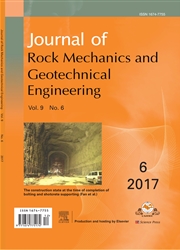

 中文摘要:
中文摘要:
Seismic wave interaction with a slippery rock joint with an arbitrary impinging angle is analytically studied based on the conservation of momentum on the wave fronts. Based on the displacement discontinuity method, the wave propagation equations are derived for incident P- and S-waves. By comparison, the calculated transmission and reflection coefficients for normal incident waves are the same as the existing results, which proves the wave propagation equation obtained in the paper is correct. The wave propagation derived in the context can be applied to incident waves with different waveforms. Stochastic seismic waves are then used to analyze the seismic wave interaction with the slippery rock joint, where the stochastic seismic waves are generated from frequency spectra. The parametric studies are carried out to investigate the effect of type, intensity and impinging angle of the incident seismic waves on the wave propagation across the slippery rock joint.
 英文摘要:
英文摘要:
Seismic wave interaction with a slippery rock joint with an arbitrary impinging angle is analytically studied based on the conservation of momentum on the wave fronts. Based on the displacement discontinuity method, the wave propagation equations are derived for incident P- and S-waves. By comparison, the calculated transmission and reflection coefficients for normal incident waves are the same as the existing results, which proves the wave propagation equation obtained in the paper is correct. The wave propagation derived in the context can be applied to incident waves with different waveforms. Stochastic seismic waves are then used to analyze the seismic wave interaction with the slippery rock joint, where the stochastic seismic waves are generated from frequency spectra. The parametric studies are carried out to investigate the effect of type, intensity and impinging angle of the incident seismic waves on the wave propagation across the slippery rock joint.
 同期刊论文项目
同期刊论文项目
 同项目期刊论文
同项目期刊论文
 In situ stress measurements by hydraulic fracturing in the Western Route of South to North Water Tra
In situ stress measurements by hydraulic fracturing in the Western Route of South to North Water Tra A case study on rock damage prediction and control method for underground tunnels subjected to adjac
A case study on rock damage prediction and control method for underground tunnels subjected to adjac Numerical simulation of transmission characteristics of oblique incidence of stress waves across lin
Numerical simulation of transmission characteristics of oblique incidence of stress waves across lin Prediction of peak particle velocity induced by underwater blasting based on the combination of grey
Prediction of peak particle velocity induced by underwater blasting based on the combination of grey Generalized damage model for asperity and shear strength calculation of joints under cyclic shear lo
Generalized damage model for asperity and shear strength calculation of joints under cyclic shear lo Optimization for the Prediction of Waveform and the Estimation of Peak Particle Velocity of Explosiv
Optimization for the Prediction of Waveform and the Estimation of Peak Particle Velocity of Explosiv 期刊信息
期刊信息
